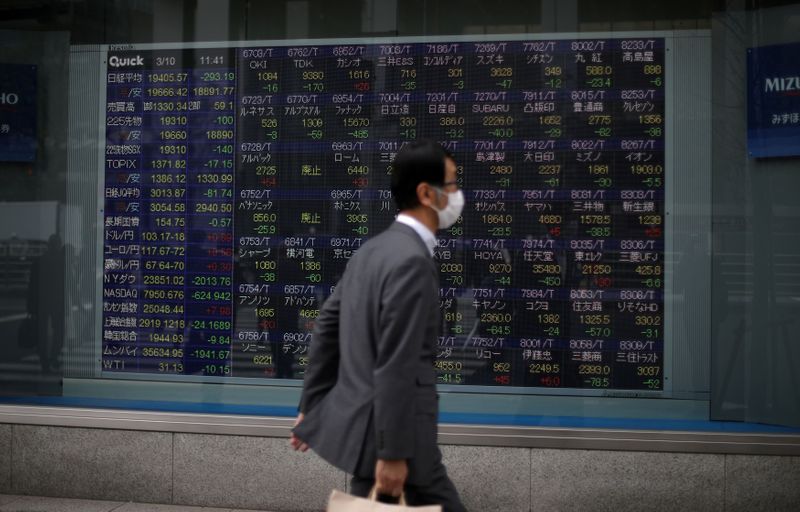By Thyagaraju Adinarayan
LONDON (Reuters) - World stocks were choppy and oil prices faltered on Friday as record numbers of new coronavirus cases in several U.S. states raised concerns that more lockdowns may be necessary, making a quick economic recovery unlikely.
The approach of the second-quarter earnings season, expected to be the worst for Europe and the United States since the 2008/09 financial crisis, also pushed investors to chase safe-haven assets, such as U.S. Treasuries and the Japanese yen.
European stocks picked up, but they were just 0.4% higher by midday after opening in the red, taking cues from Asia where a recent rally in Chinese stocks came to a halt.
China shares fell 1.8% from a five-year high, as state media discouraged retail investors from chasing the market higher.
MSCI's broadest index of Asia-Pacific shares outside Japan fell 1%. Australian stocks declined by 0.6% as an extension of loan-payment deferrals hit the banking sector. Japanese stocks were down by 1.1%.
The e-mini futures for the S&P 500 were down 0.3%.
More than 60,500 new coronavirus infections were reported across the United States on Thursday, the largest single-day tally of cases by any country since the virus emerged late last year in China.
"The sharp increase in confirmed cases has led to growing concerns that a return to broad lockdowns lies ahead," Goldman Sachs (NYSE:GS) wrote in a note. "While lockdowns can slow down virus spread effectively, they come at very high economic cost."
Economic data, however, continued to improve in the United States. The number of Americans filing for jobless benefits dropping to a near four-month low last week. But investors remained cautious as a record 32.9 million people were still collecting unemployment checks, supporting expectations the labour market would take years to recover from the COVID-19 pandemic.
"The dispersion in macro forecasts remains extremely high. It therefore should not surprise when you see market volatility turning on mixed pieces of news," said Elliot Hentov, head of Policy and Research at State Street (NYSE:STT).
COVID-19 cases have also been rising in some Asian cities that had appeared to have contained the disease, such as Tokyo, Hong Kong and Melbourne, prompting investors to take shelter in safe-haven assets.
In the currency market, the yen rose 0.4% against the dollar and 0.2% versus the euro.
U.S. Treasury yields slipped to their lowest levels since late April. Gold was the only safe haven that didn't join the rush-for-safety party, sliding 0.3%, a day after hitting an eight-year high.
In other moves, the Australian and New Zealand dollars, which are often traded as a liquid proxy for risk because of their close ties to China's economy, were both under pressure.
The Aussie also fell as local officials used lockdowns and border restrictions to contain a sudden increase in coronavirus cases.
U.S. crude oil fell 1.3% to $39.12 a barrel and Brent crude dropped 1.1% to $41.90 per barrel amid concern about a long-term decline in global energy demand.
The International Energy Agency bumped up its 2020 oil demand forecast on Friday but warned that the spread of COVID-19 posed a risk to the outlook.
